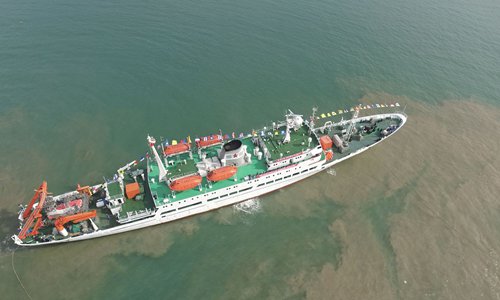
China's deep-sea manned submersible Jiaolong and its crew members arrive at the National Deep Sea Center of China in Qingdao, a coastal city in East China's Shandong Province on June 23, 2017. Photo: VCG
China's manned submersible Jiaolong successfully concluded its first deep-sea scientific expedition in the Atlantic Ocean with the research vessel Shenhai Yihao (DeepSea No.1), which transported Jiaolong, returning to its home port in Qingdao, East China's Shandong Province, on Tuesday, according to local media reports.
The voyage lasted 164 days, covering a total distance of around 57,000 kilometers, and achieving a number of important results, demonstrating the commitment and capability of Qingdao, an ocean city, in marine scientific research.
The expedition has successfully searched for, located and confirmed many active hydrothermal zones during Jiaolong's voyage, completing the dives in a total of 15 hydrothermal zones of the South and North Atlantic Ocean, collecting first-hand environmental data in the hydrothermal vent and obtained valuable samples of deep-sea hydrothermal organisms, Sun Yongfu, chief scientist of the 83rd expedition and researcher of China's National Deep Sea Center said, according to media reports.
The mid-ocean ridge is an area of intense interaction between geological and tectonic processes, biological processes and hydrodynamic processes, and it is a hotspot for the exchange of material and energy as part of the Earth's multi-circle layers, giving rise to the abundant resources needed for the sustainable development of humankind, and profoundly shaping the global marine ecosystem and biodiversity. It is a key research area for the current investigation of biodiversity and connectivity in the deep sea.
The results of the expedition have filled the gaps in biodiversity surveys in the South Atlantic Ocean, and initially provided further details related to the characteristics of biodiversity in typical hydrothermal environments in the Atlantic Ocean and their connectivity patterns, which will provide a scientific basis for the protection of the high seas of the Mid-Atlantic Ridge and environmental management.
China was once absent from manned scientific research in the Atlantic Ocean. With the implementation of the 83rd ocean expedition, the layout of China's manned scientific research work in the oceans has achieved a new expansion from Indian Ocean, Pacific Ocean, and South China Sea to the Atlantic Ocean, according to the report.
This is the first time for Chinese manned submersibles to carry out diving operations in the Atlantic Ocean, and also the first time for Jiaolong and its supporting mothership DeepSea No.1 to conduct deep-sea investigation and research in the Atlantic Ocean.
The 83rd expedition, firstly embarked from Qingdao in December 2023, carried out investigation in the Indian Ocean, South Atlantic and North Atlantic. With the in-depth implementation of the expedition and the continuous dives of Jiaolong, this expedition has achieved fruitful scientific research results.
Jiaolong ultimately undertook a total of 46 dives in the course of the expedition, which created a single expedition with the highest number of dives and the new record of three times of "nine days, nine dives." It validated Jiaolong's ability to dive, its safety parameters, and the ability to conduct precise operation in the complex conditions of the marine environment, according to Tang Jialing, the person in charge of the deep-diving operation of the 83rd expedition, according to the report.
According to the Xinhua News Agency, Jiaolong has completed its first dives in the Atlantic Ocean in February.
Global Times




